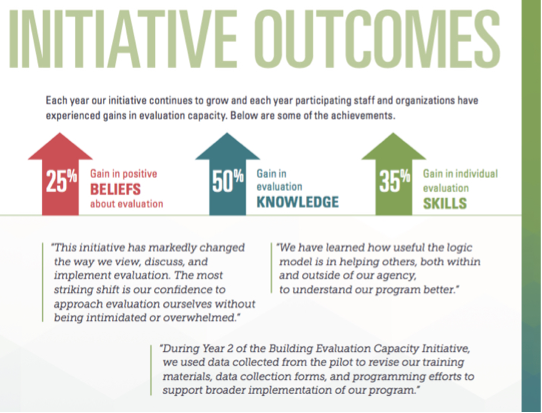Summary
The people and organizations of Philadelphia are collectively poised to achieve great things, but a lack of data-driven decision-making among nonprofit organizations and governmental agencies is impeding growth. Recognizing that many organizations are already collecting huge volumes of data, but are unable due to limited infrastructure, resources, or know-how to maximize the impact of that information, the Scattergood Foundation has undertaken its Building Evaluation Capacity Initiative, to help organizations continually improve performance and outcomes, and changing the way nonprofits are thinking and delivering services for the better.
As several news outlets have questioned over the years, will Philadelphia be the next great American city? It got the Thomas Scattergood Behavioral Health Foundation thinking: How will Philadelphia get there? And how will we know when Philadelphia has achieved this? The only thing the Scattergood Foundation did know for sure was that part of being the next great American city included all of us investing in services and supports that are efficient and effective for all Philadelphians.
While exploring this concept further, the Scattergood Foundation quickly recognized there was a lack of data-driven decision-making among nonprofit organizations and governmental agencies. The lack of data-driven decision-making appeared to be caused by the absence of internal capacity to collect and understand evaluation or continuous quality improvement data. The Scattergood Foundation further recognized that the lack of capacity resulted in organizations having difficulty with: 1) making informed program changes; 2) retaining funding in an era of increased accountability; and 3) competing for new funds. In addition, many nonprofits did not have the staff with essential data-related skills to adequately implement evidence-supported practices that required the ongoing monitoring of program processes, outcomes, and impacts. Yet, almost all agencies were collecting data, and, in many situations, lots and lots of data.
The Scattergood Foundation also came to realize that there are very few entities that will fund this challenging situation, as most funders tend to fund direct services or programs that are already evidence-based. Thus, the Scattergood Foundation has invested $668,710 into an initiative known as the Building Evaluation Capacity Initiative.1 Over the past five years, 44 organizations have been selected to participate out of the 206 organizations that have applied to the initiative. From the inception of this initiative, demand has far outpaced the supply. The initial success and tremendous need of Philadelphia nonprofits led The Barra Foundation,2 The Philadelphia Foundation,3 and the United Way of Greater Philadelphia and Southern New Jersey4 to join the Scattergood Foundation to fund an additional 13 organizations to participate in the Initiative over the last two years.
The Building Evaluation Capacity Initiative developed by the Consultation Center at Yale University School of Medicine is a unique model of training and consultation that focuses on empowering the organizations to perform multi-method and multi-level evaluations looking at issues focused on social justice, prevention, diversity, citizen participation, community strengths and more. The model allows for organizations to develop their theory of change from concept to practical, thoughtful action in support of their mission. The consultation and training provides much more than learning how to count interactions and creating reports; it is about a culture change and understanding what impact is happening in the community. Further, it is noteworthy that the organizations themselves determine what they are most interested in evaluating about their programs versus an outside entity making this decision. This ensures that the data collected will be utilized by the organization’s staff to continually improve performance and outcomes.

A common outcome reported by participating organizations is the increased ability to communicate more effectively about their programs. This has led several organizations to successfully receive additional funding for program expansion (e.g., support from the Robert Wood Johnson Foundation, PEW Charitable Trust, and the City of Philadelphia). The initiative has also helped organizations identify the need for more staffing and has led to the creation of new positions within organizations, particularly in the area of evaluation and continuous quality improvement. Importantly, the initiative has also been critical in helping organizations make often difficult decisions about whether to continue to offer existing programs or to focus efforts on new programs to achieve their goals.
The Building Evaluation Capacity Initiative is changing the way nonprofits are thinking and delivering services for the better. If we, the collective, want Philadelphia to be the next great city to live in, work in, and visit, we need for all organizations to experience the building evaluation capacity work. We need Philadelphia to be data-driven across all sectors. The Scattergood Foundation hopes that the Mayor, city agencies, philanthropic leaders, and nonprofits will work together to create and improve existing systems to be transparent, include timely data collection and data sharing, and have reasonable and responsible reporting practices.
References
1. “Building Capacity for Evaluation Initiative,” Scattergood Foundation, accessed November 6, 2016, http://www.scattergoodfoundation.org/building-evaluation-capacity-initiative-2016-2018-cohort-announced#.WB_qrmNbrOh.
2. The Barra Foundation, accessed November 6, 2016, http://www.barrafoundation.org.
3. The Philadelphia Foundation, accessed November 6, 2016, https://www.philafound.org.
4. United Way of Greater Philadelphia and Southern New Jersey, accessed November 6, 2016, http://unitedforimpact.org.
5. The Consultation Center at Yale, accessed November 6, 2016, http://consultationcenter.yale.edu.


